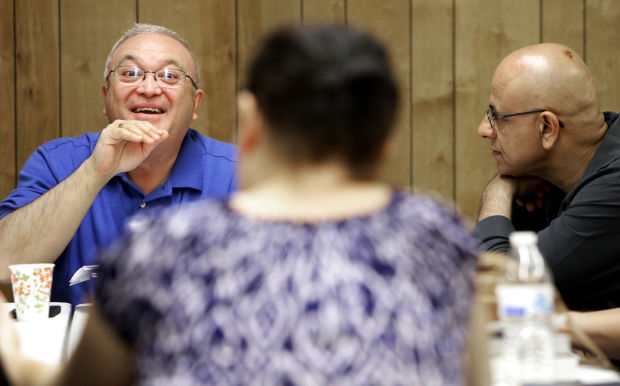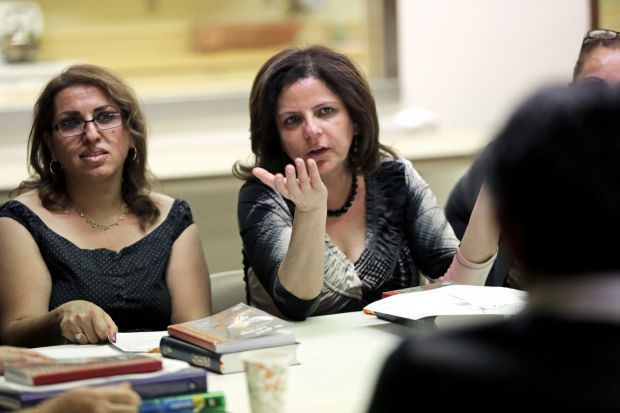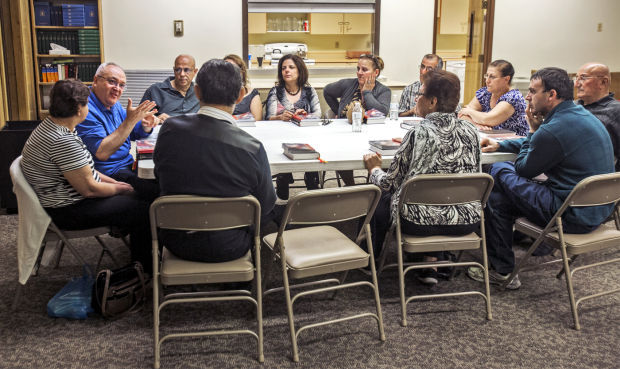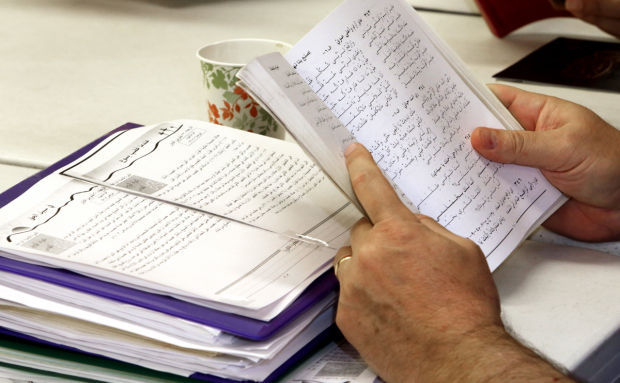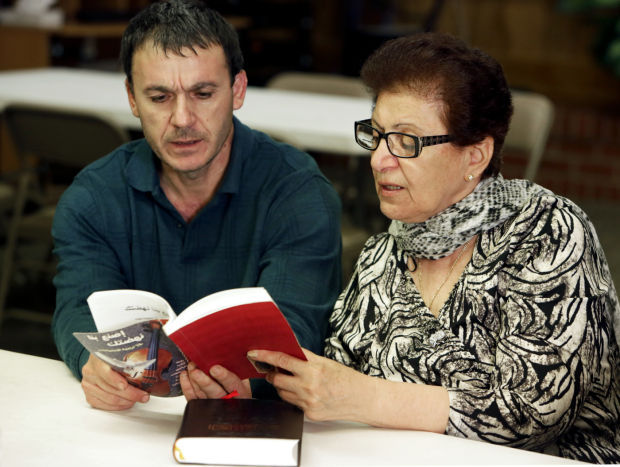At the Middle Eastern Presbyterian Fellowship, refugees, both Christian and otherwise, find community that reminds them of home.
Up to 85 people gather each Sunday for an Arabic service that meets at Northminster Presbyterian Church, 2450 E. Fort Lowell Road. The Rev. Georges Bitar leads “a mix of all denominations” — Protestant, Catholic and Orthodox Christians — along with the occasional Muslim and a Yazidi man. An increasing number of his congregation come from Iraq and Syria, he says.
They have language in common, and some remember peace at home among their faith traditions. Many share the memory of war.
And because of this, they hold Easter dear.
“Easter is the renewal of everything,” Bitar says.
“Our hope is that our countries that are really under this kind of destruction will be renewed again, and those people to be revived again and feeling that their country had been in an ordeal, yes, but not forever, and this is a resurrection for the country and the people and the faith there.”
FINDING COMMUNITY
Bitar, 57, says his fellowship represents seven nationalities, four languages and an array of educational backgrounds, “from the doctorate to the peasant.” Most are refugees. Most still have family in the Middle East or elsewhere, waiting to resettle in another country.
“My hope is just to embrace all of those who are fleeing the conflict in the Middle East,” says Bitar, who was born in Syria and came to the United States from Lebanon with his wife and two children after the 2007 clash between Islamist militants and the Lebanese army in the city of Tripoli.
Bitar still has a brother in Syria who was in Idlib when an al-Qaida affiliate and opposition fighters took control of the city last weekend. The family went for five days before they got word of his safety. Bitar says he could not focus on anything.
Others in the fellowship know this anxiety all too well.
“I am from Syria,” says Mikhael Khawam at a Sunday morning service in mid-March. He warns that his English is slow. He and his family arrived in January. “First day I was here, the day after, I come to church.”
Here, Khawam has found people who “understand me. Their problems are like my problems.”
Khawam and his wife, Amal Kilon, joined their 28-year-old son, George Khawam, in Tucson after the University of Arizona doctorate student spent “stressful” years persuading them to leave their home in Aleppo. Now the family, including George’s 22-year-old brother and 27-year-old sister, lives together in Tucson.
George has been in Tucson for five years. He says his family is “kind of lucky.” His parents began the application process to come to the U.S. around 2000. They are the ones who delayed coming until now.
George wouldn’t call himself a “hardcore believer,” but his discovery of the fellowship two or three years ago introduced him to a community that he has since shared with his parents.
Saeed Bakar, 46, also appreciates the sense of community he has found at the fellowship, even though he is not Christian. He came to the U.S. from the Sinjar area in Iraq about three years ago on a special visa for his work translating for the U.S. Army. He is Yazidi, which incorporates beliefs from Judaism, Christianity, Islam and ancient Iranian religions. But with these people, he has found a home.
“We live together in the same area and are very, very friendly,” he says of the Yazidis and Christians back in Iraq. “We live together, so we are not strangers. We are close to each other.”
Leila Hudson, associate director of the UA’s School of Middle Eastern and North African Studies, says the distrust caused by collapsing governments and extremism contrasts the religious coexistence that was once a “default in places like Iraq and Syria.”
Radical Islamists “treat us and Christians the same,” Bakar says. “They kill us, and they kill Christians. They took over our area, and they took over the Christians’ area, so we have that in common.”
After escaping the ISIS-controlled region, Bakar’s family found safety in a refugee camp in Turkey, where they are waiting until they can join Bakar. In the meantime, the congregation prays for them.
SEEKING SAFETY
In March, the Center for American Progress released a report examining the persecution of Christians in the Middle East. Particularly in countries such as Iraq and Syria, civil war and brutalities committed against religious minorities by terrorist groups such as the Islamic State group have forced Christians, among others, to leave the “lands where their faith was born and first took root,” states the report.
Amgad Beblawi, coordinator for mission activities in the Middle East and Europe through the Presbyterian Church (USA) in Louisville, Kentucky, says that in many places in the Middle East, persecution does not happen every day, but rather is a byproduct of other conflicts.
“It’s not black and white,” he says. “It’s not that Muslims aren’t persecuted and they stay, and Christians are persecuted, so they flee.”
The Rev. Elmarie Parker, regional liaison to Iraq, Syria and Lebanon for the Presbyterian Church (USA), has worked in Beirut with her husband, the Rev. Scott Parker, since December 2013. Although they see Christians targeted by radical Islamist groups, religious minorities and moderate Muslims have similar experiences, she says.
“This is the greatest threat to the region — radicalized groups who kill any who differ from them,” she writes in an email from Lebanon. “And as they do, they are destroying ancient cultures where the influences of Judaism, Christianity and Islam have been woven together in a vibrant tapestry of life for many centuries.”
She describes a Presbyterian church in a Syrian city that has been under siege for more than three years. Members limit what they eat because of the erratic arrival of food trucks and mostly keep off the electrical grid — it’s an easy target for militants.
“Listening to mortar shelling is a daily occurrence,” she writes. Still, the church shared its resources to help families from another religious minority fleeing the Islamic State group in Iraq.
“They chose to make visible God’s generous care by reaching out to a group who was suffering even more than they were,” she writes.
The Middle Eastern Presbyterian Fellowship in Tucson shares that purpose.
“We left and came here seeking safety,” Bitar says. “The Lord had really brought us here to serve this community.”
In northern Lebanon, Bitar pastored two churches under the National Evangelical Synod of Syria and Lebanon, a partner with the Presbyterian Church (USA). He remembers shelling and shooting around his own church, as he prayed within its walls. The streets were not safe to walk.
A fifth-generation Presbyterian, Bitar spent a year in Indiana with no work before the church’s office of Middle Eastern ministries presented an option.
The Bitars ended up in Tucson on the campus of Northminster Presbyterian to start the Middle Eastern Presbyterian Fellowship through the church’s Presbytery de Cristo. A 2014 directory lists more than 30 Christian Middle Eastern worship communities throughout the U.S. Beblawi thinks that is a conservative count.
The fellowship began as a Bible study in 2008 and soon added a worship service. At the start, they didn’t expect such a heavy influx of refugees, says the Rev. Ken Skodiak, an associate pastor at Northminster who meets with Bitar and his wife, Mary Bitar, almost weekly. Skodiak was part of the presbytery’s original commission to bring the family to Tucson.
The diversity of the congregation makes it a challenge.
“You have to cope with everybody and cater to their needs and be available to everybody, and that is one of the main reasons that, physically, we are so tired here,” Mary, 55, says. “But we are grateful that we are in a safe country, and we are grateful that God has chosen us to be there for those people.”
MEETING All NEEDS
Beyond pastoring his congregation, Georges Bitar hunts for employment for members of the fellowship, translates at hospitals and government offices and makes grocery-store runs.
Many of his congregation do not speak English upon arriving in Tucson.
For several months after refugees arrive, private resettlement agencies in conjunction with the U.S. State Department and the Arizona Refugee Resettlement Program provide support to refugees to include housing, food and medical assistance, among other services.
Parker writes that many of these families have suffered trauma and have left cultures that place significant emphasis on hospitality. The Bitars do what they can.
The fellowship helps some members pay rent and helps others find work. Northminster Presbyterian hosts free English language classes for adults through Literacy Connects on Mondays and Thursdays.
Bitar has worked with companies such as Wallace Packaging LLC and Five Palms Steak and Seafood to find jobs that require low levels of English proficiency.
Many of his congregants have traded degrees and comfortable homes for a life of scraping by in Tucson.
“This church is different in the sense that in Lebanon we had a homogenous church,” Mary says. “Everybody was Lebanese and middle class and higher. We did not have people at entry-level jobs. We did not have refugees. ... Despite the war in Lebanon, there was war and turmoil, but we had a more secure job.”
Now, the fellowship itself has needs. In past years, it received more financial support from the denomination’s governing bodies, such as the church’s mission agency, Synod of the Southwest and the Presbytery de Cristo. Northminster Associate Pastor Skodiak and Bitar say the decreased funding is due to a combination of cutbacks all around and limits on prolonged support for startup ministries.
The fellowship now relies heavily on support from donations and other Tucson churches.
STAYING CONNECTED
In January, Mountain Shadows Presbyterian Church, 14240 N. Oracle Road, organized a benefit dinner for the fellowship.
The event, at Trinity Presbyterian Church, 400 E. University Blvd., raised close to $20,000, says event coordinator and Mountain Shadows deacon Dennis Nelson.
It also drew participants from Resurrection Lutheran Church, 11575 N. First Ave. in Oro Valley, and the Santa Catalina Roman Catholic Parish, 14380 N. Oracle Road. The Parkers were among the speakers.
“This was not a national plan to welcome immigrants, but it is very much part of the Christian faith to be hospitable to foreigners, especially if the foreigner is a member of the same faith,” Beblawi, of the Presbyterian Church, says of the denomination’s Middle Eastern communities.
Interdenominational support is the goal, and Bitar is calling on other Christian churches in Tucson to help.
“Now we are in the midst of the church here and on the doorsteps of every single church here,” he says. “The big question is, ‘What are they doing for displaced Christians here?’”
Because of the diverse religious traditions in his congregation, Bitar has gone back to the basic truths of Christianity, exchanging complex rituals for “knowing the word and the person who set this word,” he says, referring to the Bible and Jesus Christ.
“I think the thing that bonds us together is our faith, because we all have faith in Jesus Christ. We all have the same experiences of persecution,” says Mary about this Christian community. “We can’t see our immediate family, so the church has become our immediate family.”


